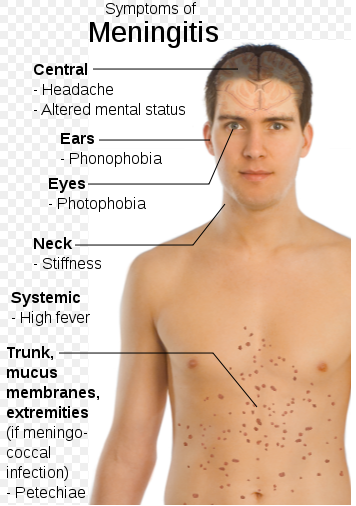Meningococcal meningitis
Chapman University Student Health (CUSH) announced Tuesday that a student has been diagnosed with meningococcal meningitis. Laboratory testing has determined that the student had serogroup B meningococcal disease.

Meningococcal meningitis is the most severe form of bacterial meningitis. Meningitis is an infection of the membranes covering the brain and spinal cord. It can also be found in the bloodstream. This particular type of meningitis is very severe and can result in death if not treated promptly. Even in cases where treatment has been given, the fatality rate is around 15%.
The symptoms of bacterial meningitis are sudden, with fever, stiff neck, body aches and headaches. As the disease progresses other symptoms may include nausea, vomiting, photophobia and seizures. A petechial rash seen on the trunk and lower extremities, bleeding complications, multi-organ failures and shock are usually final signs. This disease has the ability to kill within hours of getting it.
Up to 10-20% of older children and young adults carry this organism inthe mouth and nose, though the carriage rate will vary with age and closeness of population. The majority of people that carry this bacterium have no clinical disease. The organism is spread person to person through respiratory secretions from the nose and mouth (coughing, sneezing and kissing). Experts are unsure why some people advance to meningitis disease while many do not.
Crowded living conditions facilitate the spread of the organism and places like military barracks and college dormitories are well documented areas of concern with this disease.
The Orange County Health Care Agency (OCHCA) and/or Chapman University Student Health Services (SHS) has already notified students who have had close contact with the ill student. If you received a call from OCHCA or the SHS and have not received a dose of antibiotics yet, you should go to the SHS as soon as possible to get treatment.
Many college students have received one or two doses of the quadrivalent meningococcal conjugate vaccine (Menactra or Menveo), however this vaccine does not protect against serogroup B disease. Those who are interested in protection from meningococcal B disease can talk to their medical provider about receiving meningococcal B vaccination. There are now two vaccines against meningococcal B disease licensed in the United States: Bexsero and Trumenba.
Mumps
In a follow-up on the mumps outbreak at Chapman, the mumps tally has grown to nine. Six of nine cases have been confirmed by laboratory testing; the other three had symptoms consistent with mumps infection and known contact to a confirmed case.
Six are law school students, three are undergraduate students. Cases ages range from 19-34, and symptom onset dates extend from January 26 to March 26. The Orange County Health Care Agency is working with the University to identify any additional cases.
Related:
- California reports first mcr-1 producing bacteria in LA County
- Southern California measles outbreak: Most unvaccinated
- Mumps: Canada, the virus and the vaccine and why the comeback

